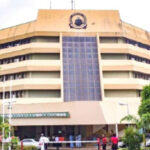Malam Shekare Ladan Kalgo, a photo journalist working with state’s ministry of information but attached to the governor’s office, is one of many civil servants engage in water melon farming.
He said he started water melon farming in 2014 in his five hectares farm in Kalgo, one of the many local government areas producing the fruit in commercial quantity.
He said he has harvested the fruit twice, the first batch of fruits that were bigger were sold at over N350,000 on first harvest, while the second harvest fetched him N220,000.
“Middlemen, buy the fruit according to its size. Water melon farming is very lucrative. I only spent about N130, 000 on manure, fertiliser and chemical spray. We apply fertiliser as they grow and pay for labour after harvest.”
He said his major challenge is water and fertilizer, adding that he buys fertilisers from the market at the cost of over N5, 000 per bag.
Kalgo said: “We dig wells to irrigate our farms and each well cost over N20, 000. Some of us, who cannot afford the water pump, hire it daily to irrigate.
“I have 17 children and three wives, so I can’t imagine how my salary will be enough without going into farming to complement my earning in my 22 years as civil servant.” Shekare.
He called on government to assist water melon farmers with water pump and fertiliser as it does assist rice and other dry season farmers, adding: “The market drops during mass harvest. This tear, we made huge profits around February, but in March/April the profits margin declined because of the general elections.”
The Director, Produce and Pest Control, Kebbi State Ministry of Agriculture, Alhaji Mohammed Lawal Argungu, said water melon thrives well in the state, adding that the major problem is that water melon cannot be produced without proper protection.
He also lamented the absence of ready market for the fruit, saying: “The state does not have an established ready market where the farmers can take water melon. Farmers largely depend on middle men who are only interested in making extra profit at the expense of the farmer who produces the fruit.
“So, the water melon that you can produce at the cost of between N400-N500 in Abuja or Kaduna, here in Kebbi state it will hardly fetch you N100 or N150, Which means that the profit of production goes to the middle men while the farmers are left suffering in the field.
“The problem is that, the farmers could not come together to form a society or farmers group and create their own middle men, from among themselves, to take their water melon to areas where they can make profit.”
He described water melon farming is a very lucrative venture, adding that it can be planted on almost all types of soil.
“But, the thing is that, if you are talking in terms of production, loamy or loamy/sandy soil provides bigger fruits at the end of production,” he said.
Argungu, however, noted that water melon irrigation farming is expensive because they farmers use water pump which uses fuel.
The director said mass production is done in Augie, Argungu, BirninKebbi, Aliero, Gwandu and Jega, Maiyama, Dandi, Kalgo, Buza and, to some extent, in Yauri and Zuru LGAs.
He said the content of water melon is about 90 per cent water, so the preservation process is difficult, adding that the ministry advises farmers to use rice or any other available crop shrub to cover it so that it can reduce the rate of evaporation.
“We also advise them to check their fruit to see if there is anyone which is infested by any insect or disease in order not to have cross-infestation.
“If investors or government can establish a market and, at least, one processing plant in the state that will extract and can it (water melon), I think that will be appreciated by farmers in the state.”
He said the fruit is exported to many countries.
He said that the fruit cannot be produced, simultaneously, on same farm with other crops because it is the type of crop that spreads on earth.
Findings by our correspondent revealed the existence of a young Argungu-based association known as Gulma Young Water Melon Farmers Association.
The chairman of the association, Malam Adamu Saidu, said: “Almost half of the over 2,000 members of our association have their produce infested by strange worms. The challenge of lack of market worsened this year because of the general elections that scared most of our dealers from going to the South. It got to a stage where we had to dispose the produce, locally, at give-away prices because they have started perishing. That is why you can even get a jumbo size for as low as N50 or N70.”
The chairman appealed to the incoming governments, at state and federal levels, to create market, processing factory, provide fertilizer, chemicals and improved seeds to farmers.
“Farmers major problem is lack of fertiliser and water pumps to irrigate from many rivers around Argungu. But, we are hoping that the new governments will look into these issues because farming the fruit is profitable.”
 Join Daily Trust WhatsApp Community For Quick Access To News and Happenings Around You.
Join Daily Trust WhatsApp Community For Quick Access To News and Happenings Around You.


